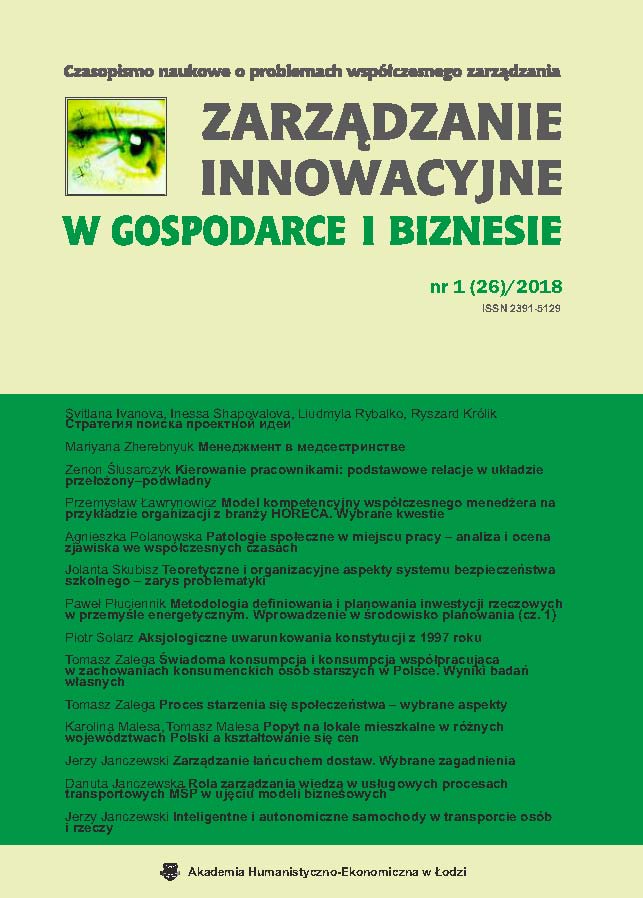Conscious and collaborative consumption in the consumer behaviour of Polish seniors. Results of author’s own research
DOI:
https://doi.org/10.25312/2391-5129.26/2018_103-120Keywords:
seniorzy, świadoma konsumpcja, współpracująca konsumpcja, zachowania konsumenckieAbstract
This article focuses on the consumer behaviour of people aged 65+ in Poland that may be classified as conscious and collaborative
consumption. The article primarily seeks to offer some insight into both consumer trends within the consumer decision-making process among Polish seniors. The basis for the conclusions is provided by direct research conducted in the form of a questionnaire using a sample of 2537 people aged 65+ in 2014–2015 in ten Polish cities of various populations and sizes.
References
„Polityka”, (2013), Wywiad z M. Maseffoli, 10–16.04.
Bainbridge J. (2013), Understanding collaborative consumption, “Marketing Magazine”, September 6, http://www.marketingmagazine.co.uk/article/1208887/understanding-collaborative-consumption [dostęp: 10.11.2014].
Bardhi F., Eckhardt G.M. (2012), Access-Based Consumption: The Case of Car Sharing, “Journal of Consumer Research”, Vol. 39, No. 4.
Bauwens M., Mendoza N., Iacomella F. (2012), Synthetic Overview of the Collaborative Economy, P2P Foundation, https://p2pfoundation.net/wp-content/uploads/2018/02/Synthetic-overview-of-the-collaborative-economy.pdf [dostęp: 21.10.2014].
Belk R. (2010), Sharing, “Journal of Consumer Research”, Vol. 36, No. 5, February.
Belk R. (2014), You are what you can access: Sharing and collaborative consumption online, “Journal of Business Research”, Vol. 67(8).
Bostrom M., Klintman M. (2011), Eco-standards, product labeling and green consumerism, Palgrave Macmillan, Basingstoke.
Botsman R., Rogers R. (2010a), What’s Mine Is Yours: The Rise of Collaborative Consumption, Harper Business, New York.
Botsman R., Rogers R. (2010b), Beyond Zipcar: Collaboration Consumption, “Harvard Business Review”, Vol. 88(10), October.
Crane A., Matten D. (2007), Business Ethics, Oxford University Press, Oxford.
Doane D. (2001), Taking Flight: The Rapid Growth of Ethical Consumerism, New Economics Foundation, London.
Felson M., Spaeth J.L. (1978), Community Structure and Collaborative Consumption: A routine activity approach, “American Behavioral Scientist”, No. 21, March–April.
Freestone O.M., McGoldrick P.J. (2008), Motivations of the ethical consumer, “Journal of Business Ethics”, Vol. 79.
Gansky L. (2010), The Mesh: Why the Future of Business Is Sharing, Penguin Books, New York.
Goleman D. (2009), Inteligencja ekologiczna, Rebis, Poznań.
Hamari J., Sjöklint M., Ukkonen A. (2016), The sharing economy: why people participate in collaborative consumption, “Journal of Association for Information Science and Technology”, Vol. 67(9).
John N.A. (2013), Sharing and Web2.0: The Emergence of a Keyword, “New Media Society”, Vol. 5, No. 2.
Lawson S.J. (2011), Forsaking Ownership: Three Essays on Non-Ownership Consumption and Alternative Forms of Exchange. Electronic Theses, Treatises and Dissertation, Paper 3221, http://diginole.lib.fsu.edu/7etd/3221 [dostęp: 15.02.2015].
Makarem S.C., Jae H. (2016), Consumer Boycott Behavior: An Exploratory Analysis of Twitter Feeds, “The Journal of Consumer Affairs”, Vol. 50(1).
Moschis G.P. (1992), Marketing to older consumers, Quorum Books, Westport–Connecticut–London.
Ritzer G. (2004), Magiczny świat konsumpcji, Warszawskie Wydawnictwo Literackie Muza S.A., Warszawa.
Rostek A., Zalega T. (2015), Konsumpcja kolaboratywna wśród młodych polskich i amerykańskich konsumentów (część 1), „Marketing i Rynek”, nr 5.
Schor J.B., Fitzmaurice C.J. (2015), Collaborating and connecting: the emergence of the sharing economy, [w:] L.A. Reisch, J. Thøgersen (red.), Handbook of Research on Sustainable Consumption, Edward Eldgar Publishing Inc., Cheltenham–Northampton.
Shaw D., Newholm T. (2002), Voluntary simplicity and the ethics of consumption, “Psychology & Marketing”, Vol. 19(2).
Singer P., Mason J. (2006), The Ethics of What We Eat, Publishing Company, Melbourne.
Szubrycht J. (2012), Bogacenie się przez dzielenie, „Polityka”, nr 26.
Unece Strategy for Education for Sustainable Development (2014), http://www.unece.org/env/esd.html [dostęp: 16.10.2018].
Walsh B. (2011), Today’s Smart Choice: Don’t Own. Share, “Time Magazine”, http://content.time.com/time/specials/packages/article/0,28804,2059521_2059717_2059710,00.html [dostęp: 21.10.2014].
Wardak P., Zalega T. (2013), Konsumpcja kolaboratywna jako nowy trend konsumencki, „Studia i Materiały”, nr 1.
Wheale P., Hinton D. (2007), Ethical Consumers in Search of Markets, “Business Strategy and the Environment”, Vol. 16.
Wildowicz-Gigiel A. (2009), Etyczny wymiar konsumpcji w świetle wyzwań XXI wieku, „Optimum. Studia Ekonomiczne”, nr 1(41).
Zabkar V., Hosta M. (2013), Willingness to act and environmentally conscious consumer behaviour: can prosocial status perceptions help overcome the gap?, „International Journal of Consumer Studies”, Vol. 37, No. 3.
Zalega T. (2015a), Zrównoważony rozwój a zrównoważona konsumpcja – wybrane aspekty, „Konsumpcja i Rozwój”, nr 4(13).
Zalega T. (2015b), Idea sprawiedliwego handlu (Fair Trade) – zarys problematyki, „Konsumpcja i Rozwój”, nr 3(12).
Zalega T. (2016), Segment osób w wieku 65+ w Polsce. Jakość życia, konsumpcja, zachowania konsumenckie, Wydawnictwo Naukowe Wydziału Zarządzania UW, Warszawa.
Zalega T. (2017), Wybrane alternatywne trendy konsumenckie a zachowania konsumenckie osób w wieku 65+, „Konsumpcja i Rozwój”, nr 1(18).
Downloads
Published
Issue
Section
License
Copyright (c) 2018 Akademia Humanistyczno-Ekonomiczna w Łodzi

This work is licensed under a Creative Commons Attribution-ShareAlike 4.0 International License.

